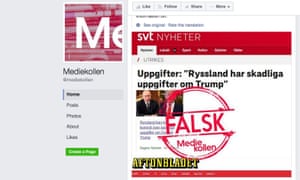In the post-truth era Sweden's far right fake fact checker was inevitable
In the post-truth era Sweden's far right fake fact checker was inevitable

Anyone who thought the furore over fake news would lead to fast and effective action to tackle disinformation on the web has been quickly disabused of the notion.
From Donald Trump labelling news sources he doesn’t like as “fake news” to doubts about Facebook’s plans to use third-party fact checkers to verify disputed stories, each twist and turn seems to open up a new can of worms.
An example of exactly how intractable and complex the problem is cropped up in Sweden last week with a Facebook group called Mediakollen, which promised to debunk false information on the web, challenging inaccurate articles and statements using the visual cues and language of fact checking.
Except Mediekollen is itself a tool of disinformation. It is, in effect, a fake fact checker.
A glance at the posts on the Mediekollen page should be enough to tell most discerning readers that something isn’t quite right. Its first post, on 11 November, attempts to debunk the infamous dossier on Donald Trump, which the president-elect himself has called fake news.
Mediekollen not only suggested that the claims made in the dossier could not be proven (something almost all news outlets who have covered it have stressed), it also bases its pronouncement on a thoroughly discredited theory that the allegations contained in the dossier originated on message-board 4chan.
But the most interesting post was the only one with a reassuringly-green verified stamp. It dealt with incendiary comments made by Swedish author Katerina Janouch to Czech TV about migration, including false claims that the country had more than 50 “no-go” zones police were afraid to enter.
Janouch later retracted much of what she said after one of the country’s largest newspapers challenged its factual basis. But as far as Mediekollen was concerned it was all true, and its post used a series of statistics and links to opinion pieces to back up its case.
Anders Lindberg, a journalist at Swedish daily Aftonbladet, came across Mediekollen after readers began emailing him in support of Janouch’s statements and linking to its page.
He said: “People started linking to this site, challenging the narrative. ‘Here we have this fact checker, and this fact checker says that she is right’. [Janouch] was sharing this fact checker as proof that she was right.”
Lindberg also notes that the Facebook group had also been set up just after Janouch’s comments began to be challenged, suggesting it was created with the goal of validating her anti-immigration viewpoint.
Much of the information Mediekollen uses in its version of a fact check is indeed based on fact. But unlike most established fact checkers, which pick out figures or statements to verify or debunk, it creates a different narrative using other pieces of evidence or opinion to support or knock down a statement or story. It is argument, often deliberately misleading, dressed up as verification.
Hanna Larsson, a digital executive at Swedish TV, challenged the page’s admins to reveal who they were, whether they had backers and who their clients were, but got only cut-and-paste answers giving no convincing explanation.
She said: “The page could be a hobby project from a single guy who wants to reach out with his agenda. But it could just as well be started by some organisation who wants to spread distrust of the media and other recognised sources.”
There has been talk both in Sweden and globally about supposed Russian disinformation campaigns, but while it seems unlikely Russia was directly involved in Mediekollen, the page’s approach fits neatly into a doctrine espoused (and practiced) by one of the most influential figures in the country’s politics, Vladislav Surkov.
A close ally of Vladamir Putin, Surkov realised something powerful about information warfare. Traditional propaganda focuses on trying to create a new narrative favourable to its practitioner’s interests. But building a new dominant narrative is hard, and it has to compete with the other side’s propaganda. Surkov realised that it is just as effective to knock down all the other narratives, and leave those you are trying to sway or control unsure of what the truth is, or who to trust.
As Lindberg puts it: “You don’t need a new narrative. You just say everyone is a liar, everyone is the same, there is no definition of truth, is my truth the same as yours? Don’t trust the media. Don’t trust the authorities.
“The far-right narrative is growing together with these kind of Russian narratives. It’s not that they came from the same source – I don’t think this is a Russian operation – but it is in the same family of ideas.”
Larsson doesn’t think Mediekollen is likely to become a widely trusted source; it only has a few hundred likes on Facebook and hasn’t posted since January. She said: “Pages like this can strengthen people and groups who already made their minds up about what the world is like, no matter what facts, science or journalists say.
“It is a filter bubble phenomenon. I think it it could increase the distrust of the media among people who believe in hidden agendas etc.”
What is more worrying is how easy it was for a single Facebook page to co-opt the language of fact checking to push its own agenda. Facebook hasn’t responded to a request for comment but really this was easy to predict. It’s the inevitable response to using fact checkers.
And a fake fact checker doesn’t need to convince lots of people its take is right. It just needs to sow enough doubt about what the facts are to undermine more rigorous attempts to pin down the truth.
The battle between truth and lies, much of it fought in a grey area between the two, is only going to get murkier.
Comments